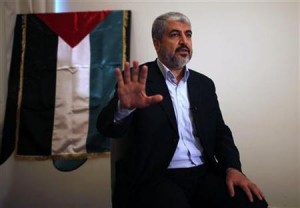 Hamas’s exiled leader will step onto Palestinian land for the first time in 45 years on Friday for a “victory rally” in the Gaza Strip, displaying his newfound confidence after last month’s conflict with Israel.
Hamas’s exiled leader will step onto Palestinian land for the first time in 45 years on Friday for a “victory rally” in the Gaza Strip, displaying his newfound confidence after last month’s conflict with Israel.
The Islamist group’s leader, Khaled Meshaal, who has not visited the Palestinian Territories since leaving the West Bank at age 11, emerged emboldened from the eight day conflict which ended in a truce he negotiated under Egypt’s auspices. He has since spoken of reaching out to other Palestinian factions.
“There is a new mood that allows us to achieve reconciliation,” Meshaal told Reuters in an interview last Friday from Qatar, where he has set up home since leaving Syria earlier this year.
He will stay for a little more than 48 hours in the coastal enclave, which Hamas has ruled since a 2007 war with Fatah that rules the West Bank.
Hamas plans an open-air rally on Saturday to promote what it says was last month’s victory against Israel, and at the same time commemorate the 25th anniversary of the group’s founding.
The Arab Spring revolts of the last two years have brought friends of Hamas to power across the region, above all Egypt’s new President Mohamed Mursi, whose long-banned Muslim Brotherhood is spiritual mentor to Hamas.
Some 170 Palestinians and six Israelis, mostly civilians on both sides, died in last month’s fighting. Israel denies that the conflict was a victory for Hamas, saying its air strikes severely weakened Hamas by taking out its missiles.
But the fighting clearly boosted Hamas’s standing in the region, winning it the support of Arab neighbors while leaving its Fatah rivals on the side lines. And Meshaal’s role in negotiating the truce raised his own personal standing within the group, although he says he plans to stand down soon.
Saturday’s rally is not being held on the exact date of Hamas’s founding, but on the 25th anniversary of the start of the first Palestinian uprising, or intifada, against Israel.
That is being seen as an overture to other factions and a hint of a new willingness to seek reconciliation with Palestinian President Mahmoud Abbas, who controls the West Bank.
The Arab Spring has seen Hamas, long supported by Shi’ite Iran, grow closer to neighboring Sunni Arab states. Although Israel steadfastly refuses to talk to a group which calls for its destruction and rockets its towns, Meshaal, who has survived poisoning by Israeli assassins, could yet emerge as an important figure in the long-stalled Israeli-Palestinian peace process.
Workers have festooned Gaza with the green flag of Hamas ahead of Meshaal’s arrival via neighboring Egypt. A large stage has been set up in the strip’s main city, complete with a huge model of the homemade M75 rocket, which was fired at both Tel Aviv and Jerusalem in last month’s conflict.
LEAVING SYRIA
Meshaal, 56, ran the group from exile in Damascus from 2004 until January this year when he quit the Syrian capital because of Iranian-backed President Bashar al-Assad’s war against Sunni Muslim rebels. He now divides his time between Qatar and Cairo.
His abrupt departure from Syria initially weakened his position within Hamas: ties with Damascus and Tehran had made him important, but with those links damaged or broken, rivals based within Gaza had started to assert their authority.
However, the exiled leader regained the initiative during the November fighting, working closely with Egypt and its new Muslim Brotherhood rulers to secure the ceasefire.
His newfound confidence was evident when he appeared alongside Mursi after the deal with Israel. Nevertheless, he told Reuters he plans to step down as Hamas leader, despite calls on him “internally and externally” to carry on.
Many Gazans doubt he will actually leave his post. It has not been made clear whether his visit will mark the end of a secretive leadership election ongoing for six months.
Gaza, which is still cut off from the outside world by an Israeli land and sea blockade, has been breaking out of its isolation, with recent high level delegations from Qatar, Turkey, Egypt and the Arab League.
“There is a new Arab presence, there is a different kind of support,” Meshaal said last week.
The white-bearded leader survived an Israeli assassination attempt in Jordan in 1997. Hamas denied seeking guarantees that he would not be targeted in Gaza and senior official Salah Al-Bardaweel said the group’s security forces would protect him.
Hamas’s 1988 charter formally calls for the destruction of Israel but Meshaal has sought to temper the discourse in recent years, backing the idea of a long-term truce in return for a withdrawal to the lines established ahead of the 1967 war, when Israel seized East Jerusalem, the West Bank and Gaza Strip.
“We accepted (the idea), but not at the expense of recognizing Israel or giving away Palestinian rights, but as a common (Arab) factor,” he told Reuters last week.
Reuters

Leave a Reply
You must be logged in to post a comment.